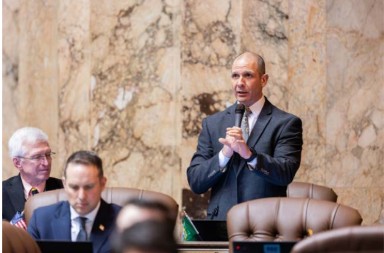
District 20 Representative Peter Abbarno
By Peter Abbarno
For the C-C Chamber of Commerce
As your representative and a proud member of our vibrant Lewis County community,
I’ve always believed that small businesses are the heartbeat of our local economy. From the corner café serving morning coffee to the family-owned hardware store that has supported generations, these enterprises are not only job creators but community builders.
That’s why I’m deeply concerned by the slate of tax increases and burdensome regulations passed during the 2025 legislative session in Olympia—legislation championed by the majority party that will make it harder for small businesses across Washington to survive, let alone thrive.
Let’s be clear: the last few years have not been easy for anyone. Our local business owners have weathered the COVID-19 pandemic, record inflation, supply chain disruptions, and labor shortages. Yet despite these challenges, many have continued to invest in our communities, hire local workers, and provide essential services with grit and resilience. They deserve our support, not more roadblocks from the state legislature.
Unfortunately, that’s exactly what they got this session.
New and higher taxes
In a time when small businesses are struggling to stay afloat, the Democrat majority in Olympia passed new taxes and increased existing ones, including a new regressive tax on certain business services and an increase in B&O taxes for many industries.
These changes hit small and mid-sized businesses hardest, especially those with narrow margins who can’t simply absorb the extra costs. At the same time, small business owners were taxed, while the majority exempted some of the largest and wealthiest corporations from the very same B&O tax.
More regulations, less flexibility
The regulatory burden has also grown significantly. From new environmental compliance mandates to stricter employment reporting requirements, the 2025 session was a regulatory onslaught.
Many of these rules were crafted without input from the small business community and with little regard for their cost or practical impact. What might be manageable for a multinational corporation in Seattle can be crippling for a five-employee machine shop in Chehalis.
We need a balanced approach that protects workers and the environment without sacrificing the entrepreneurial spirit that drives our local economy. These new regulations do the opposite. They are layered, unclear, and expensive to implement.




